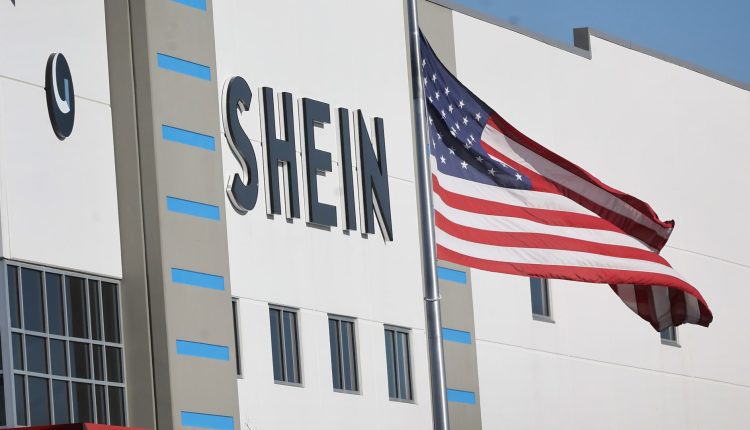Chinese-founded online retail giant Shein is not positioning itself as an Amazon “clone,” the company told CNBC, as it prepares for a U.S. public listing later this year.
The e-commerce company’s product categories are likely to “grow over time,” as the business entrenches itself deeper into the U.S., Peter Pernot-Day, head of strategic communications, U.K. and U.S., said. But that expansion will vary from market to market, and skew heavily toward Generation Z — born between the late 1990s and early 2000s — and younger Millennial consumers, who were born between the early 1980s and late 1990s.
“I don’t see us an an Amazon clone per se,” Pernot-Day said at the World Economic Forum in Davos, Switzerland.
The Singapore-headquartered fashion brand has already ventured into product lines as diverse as electronics, sports and home appliances, after winning over millions of U.S. shoppers during the pandemic with its low-cost and seemingly limitless clothing lines.
It is now forecast to supersede high street rivals H&M and Zara owner Inditex, with estimated revenues of $24 billion in the first nine months of 2023, according to tech publication The Information.
“One of the things we are very good at is measuring and responding to customer demand and that flexibility allows us to tailor our offering to different geographies,” Pernot-Day said.
“So, product categories vary across these markets. But the core point is that being receptive and responsive to Generation Z, younger Millennial shoppers, is something that leads to growth,” he added.
U.S. IPO in sight
The expansion comes as competition mounts in the U.S. e-commerce market ahead of Shein’s hotly watched 2024 initial public offering (IPO).
The listing is expected to fetch the company a valuation of $90 billion, though reports on Thursday suggested that current investors — spooked by regulator scrutiny and growing competition — are selling shares that would value the business as low as $45 billion. A company spokesperson said valuations in secondary sales don’t necessarily reflect real-world value.
Shortly after Shein confidentially filed to go public in November, Amazon — which accounts for around 38% of the U.S. e-commerce market, according to Statista — announced that it would cut fees for merchants selling clothing priced below $20 in a shift toward Shein’s ultra-low cost territory.
Amazon currently offers a wide variety of entertainment, household, utility, food and fashion products, and produces some clothing items under its own private label. In contrast to Shein, it also allows third-party retailers to offer products on its platform. The pair have also been compared to popular Chinese online marketplace Temu, which entered the U.S. market in 2022.
Pernot-Day did not give a timeline on the upcoming listing. However, he said that the company’s growth strategy going forward would be directed not by competitors, but by its customer led “on-demand” model, which allows it to trial small batches of products with users before rolling them out in full.
“We’re focused on our on-demand model, and I think it’s a unique model,” he said.
A sign hangs outside of the Shein warehouse on November 29, 2023 in Whitestown, Indiana. The Chinese-founded online clothing retailer with a valuation of around $66 billion has filed to go public in the U.S. as the company continues to expand.
Scott Olson | Getty Images News | Getty Images
“As a fashion-first company, I think we’re excited to see how the beauty of fashion and this on-demand production continues to reflect customer demand and grow as a business.”
That emphasis comes as the company attempts to move away from the “ultrafast fashion” label for which it has become known, amid wider scrutiny on the sustainability of the fashion industry.
Shein is estimated to add between 2,000 and 10,000 small batches of new items to its app every day, according to The State of Fashion 2024, an annual report from industry outlet Business of Fashion and management consultancy firm McKinsey and Company. The average of cost of those items is $14, well below H&M’s $26 and Zara’s $34.2.
Pernot-Day said the tech supported model had helped it to “dramatically reduce” both production waste and customer costs.
“We see that flexibility, that resilience that comes through technology, as being something that’s critical to our continued success as we expand our business,” he said.
Such practices will be under the spotlight as U.S. regulators assess the company’s IPO filing amid accusations that it uses forced labor in its supply chain, violates labor laws, harms the environment and steals designs from independent artists — claims the company denies.
Shein’s ties to Beijing will also face scrutiny. Last week, China’s internet regulator launched a review into the company’s data handling and sharing practices, as well as the Chinese data that it may be expected to disclose to U.S. regulators.
A source close to the company told CNBC that Shein had instigated the review into supplier-related data, and that this was “routine procedure.”
Pernot-Day said separately that Shein looks forward to “working with stakeholders in both government and civil society as we share our business model” in the U.S.
Read the full article here

